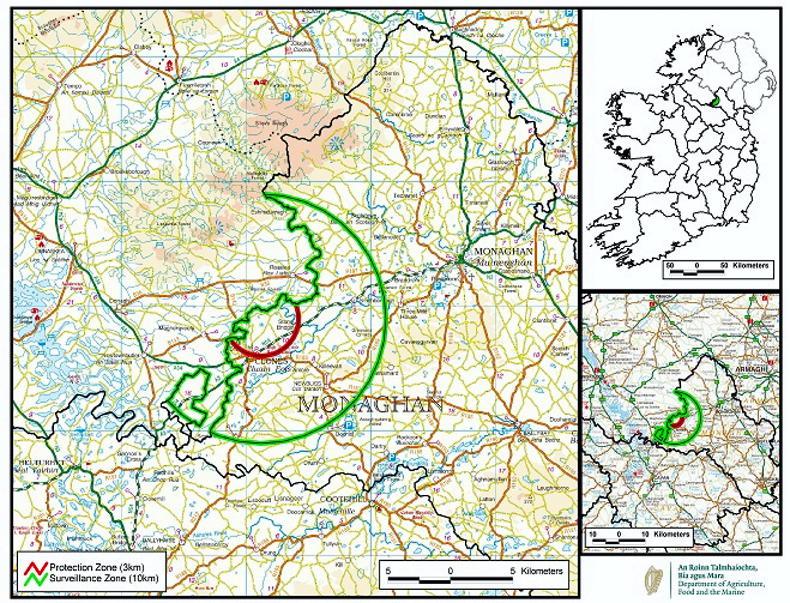The Department of Agriculture has confirmed that the H5N1 strain of bird flu has been found in poultry samples from a turkey flock in Co Monaghan.
The samples are set to undergo further testing by the Department to determine the pathogenicity of the strain and results of these tests are expected over the coming days.
Highly pathogenic avian influenza found to be circulating within wild bird populations over the summer can have a mortality rate of up to 100% in affected poultry flocks, however, the Department has not yet commented on the pathogenicity of the Co Monaghan turkey samples.
Protection zone
A protection zone of 3km around the case site has been introduced and will remain in place for at least 21 days after the preliminary cleaning and disinfection of the infected holding.
Another 10km-wide surveillance zone is to be kept in place for at least 30 days after the preliminary cleaning and disinfection of infected holding.
If any additional cases are confirmed, the protective zones’ required operation time will be restarted.

A protection zone of 3km around the case site has been introduced and will remain in place for at least 21 days after the preliminary cleaning and disinfection of the infected holding.
A census of both zones will be carried out and licensing procedures put in place covering the movement of live birds, eggs, manures, bird carcasses and other livestock from units within the zones.
All poultry owners are legally obliged to comply with the Department’s investigations.
Flock owners must allow the census of their birds to take place, allow samples to be taken and provide officials with all necessary information on the movement of poultry to and from the unit over the risk period.
Any increase in bird mortality or sickness is to be reported to the Department, as is any drop in egg production.
Biosecurity
Biosecurity measures are in place for feed lorries moving from units within protective zones as the Department has warned that the virus can be spread through contaminated litter or feed, as well as by bird-bird contact.
People can also spread bird flu via contaminated clothing, footwear and hands but the risk to humans is considered to be “very low” and there is no evidence of a human health risk associated with consumption of poultry foods.
A housing order was issued by the Department declaring that all poultry must be housed until further notice from 7 December.
Flock owners have been reminded to report suspected cases immediately to their local Regional Veterinary Office or to ring the avian influenza helpline at 01-6072512 during office hours and 01-492026 outside office hours.
The Department of Agriculture has confirmed that the H5N1 strain of bird flu has been found in poultry samples from a turkey flock in Co Monaghan.
The samples are set to undergo further testing by the Department to determine the pathogenicity of the strain and results of these tests are expected over the coming days.
Highly pathogenic avian influenza found to be circulating within wild bird populations over the summer can have a mortality rate of up to 100% in affected poultry flocks, however, the Department has not yet commented on the pathogenicity of the Co Monaghan turkey samples.
Protection zone
A protection zone of 3km around the case site has been introduced and will remain in place for at least 21 days after the preliminary cleaning and disinfection of the infected holding.
Another 10km-wide surveillance zone is to be kept in place for at least 30 days after the preliminary cleaning and disinfection of infected holding.
If any additional cases are confirmed, the protective zones’ required operation time will be restarted.

A protection zone of 3km around the case site has been introduced and will remain in place for at least 21 days after the preliminary cleaning and disinfection of the infected holding.
A census of both zones will be carried out and licensing procedures put in place covering the movement of live birds, eggs, manures, bird carcasses and other livestock from units within the zones.
All poultry owners are legally obliged to comply with the Department’s investigations.
Flock owners must allow the census of their birds to take place, allow samples to be taken and provide officials with all necessary information on the movement of poultry to and from the unit over the risk period.
Any increase in bird mortality or sickness is to be reported to the Department, as is any drop in egg production.
Biosecurity
Biosecurity measures are in place for feed lorries moving from units within protective zones as the Department has warned that the virus can be spread through contaminated litter or feed, as well as by bird-bird contact.
People can also spread bird flu via contaminated clothing, footwear and hands but the risk to humans is considered to be “very low” and there is no evidence of a human health risk associated with consumption of poultry foods.
A housing order was issued by the Department declaring that all poultry must be housed until further notice from 7 December.
Flock owners have been reminded to report suspected cases immediately to their local Regional Veterinary Office or to ring the avian influenza helpline at 01-6072512 during office hours and 01-492026 outside office hours.







 This is a subscriber-only article
This is a subscriber-only article











SHARING OPTIONS: